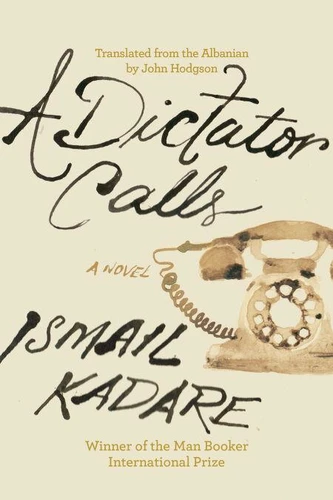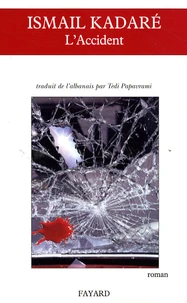Né le 28 janvier 1936 en Albanie, Ismaël Kadare, en est certainement l'auteur le plus connu, son uvre abondante ayant été traduite dans une trentaine de langues. Après des études de lettres à Tirana puis à Moscou, il revient dans son pays et commence à écrire : d'abord des articles pour des journaux, puis des romans, des nouvelles, de la poésie, des pièces de théâtre
Son premier roman : "Le général de l'armée morte" est publié en 1963 ; il sera traduit en français en 1983 et porté au cinéma la même année. Sa notoriété lui vaut d'être élu député sans avoir déposé sa candidature, et contraint d'adhérer au parti gouvernemental. Mais au travers de ses écrits il continue de lutter contre le totalitarisme communiste ; à cause de cela il va être rapidement contraint de faire publier ses romans à l'étranger, avant de s'exiler et de demander l'asile politique en France en 1990. Parmi ses écrits trop nombreux pour être tous listés, on peut citer : "Avril brisé" (1988), "Le Palais des rêves" (1990),"L'année noire" (1997)," Albanie, visage des Balkans" (1995), "Le successeur" (2003), "le Dîner de trop"(2009), "l'Entravée" (2010) ou "La provocation et autres récits" en 2012, la plupart édités par Fayard en Albanais et en Français. Il nous permet une meilleure connaissance de l'histoire des Balkans, grâce à " Albanie, visage des Balkans" (1995), et "Temps barbares. De l'Albanie au Kosovo" (1999). Reconnu internationalement par les critiques, il a reçu en 2009 le prix Prince des Asturies pour l'ensemble de son uvre.
A Dictator Calls
Par : ,Formats :
Disponible dans votre compte client Decitre ou Furet du Nord dès validation de votre commande. Le format ePub protégé est :
- Compatible avec une lecture sur My Vivlio (smartphone, tablette, ordinateur)
- Compatible avec une lecture sur liseuses Vivlio
- Pour les liseuses autres que Vivlio, vous devez utiliser le logiciel Adobe Digital Edition. Non compatible avec la lecture sur les liseuses Kindle, Remarkable et Sony
- Non compatible avec un achat hors France métropolitaine
 , qui est-ce ?
, qui est-ce ?Notre partenaire de plateforme de lecture numérique où vous retrouverez l'ensemble de vos ebooks gratuitement
Pour en savoir plus sur nos ebooks, consultez notre aide en ligne ici
- Nombre de pages240
- FormatePub
- ISBN978-1-64009-609-7
- EAN9781640096097
- Date de parution19/09/2023
- Protection num.Adobe DRM
- Taille994 Ko
- Infos supplémentairesepub
- ÉditeurCounterpoint
Résumé
Longlisted for the International Booker PrizeThe Wall Street Journal, A Best Book of the YearUsing a sophisticated and literary version of the ever-popular game of telephone to examine the relationship of writers with tyranny, Ismail Kadare reflects on three particular minutes in a long moment of time when the dark shadow of Joseph Stalin passed over the worldIn June 1934, Stalin allegedly called Boris Pasternak and they spoke about the arrest of Osip Mandelstam.
A telephone call from the dictator was not something necessarily relished, and in the complicated world of literary politics it would have provided opportunities for potential misunderstanding and profound trouble. But this was a call one could not ignore. Stalin wanted to know what Pasternak thought of the idea that Mandelstam had been arrested. Ismail Kadare explores the afterlife of this phone call using accounts of witnesses, reporters, writers such as Isaiah Berlin and Anna Akhmatova, wives, mistresses, biographers, and even archivists of the KGB.
The results offer a meditation on power and political structure, and how literature and authoritarianism construct themselves in plain sight of one another. Kadare's reconstruction becomes a gripping mystery, as if true crime is being presented in mosaic. A little time ago the poet Mandelstam was arrested. What have you to say to that, Comrade Pasternak?
A telephone call from the dictator was not something necessarily relished, and in the complicated world of literary politics it would have provided opportunities for potential misunderstanding and profound trouble. But this was a call one could not ignore. Stalin wanted to know what Pasternak thought of the idea that Mandelstam had been arrested. Ismail Kadare explores the afterlife of this phone call using accounts of witnesses, reporters, writers such as Isaiah Berlin and Anna Akhmatova, wives, mistresses, biographers, and even archivists of the KGB.
The results offer a meditation on power and political structure, and how literature and authoritarianism construct themselves in plain sight of one another. Kadare's reconstruction becomes a gripping mystery, as if true crime is being presented in mosaic. A little time ago the poet Mandelstam was arrested. What have you to say to that, Comrade Pasternak?
Longlisted for the International Booker PrizeThe Wall Street Journal, A Best Book of the YearUsing a sophisticated and literary version of the ever-popular game of telephone to examine the relationship of writers with tyranny, Ismail Kadare reflects on three particular minutes in a long moment of time when the dark shadow of Joseph Stalin passed over the worldIn June 1934, Stalin allegedly called Boris Pasternak and they spoke about the arrest of Osip Mandelstam.
A telephone call from the dictator was not something necessarily relished, and in the complicated world of literary politics it would have provided opportunities for potential misunderstanding and profound trouble. But this was a call one could not ignore. Stalin wanted to know what Pasternak thought of the idea that Mandelstam had been arrested. Ismail Kadare explores the afterlife of this phone call using accounts of witnesses, reporters, writers such as Isaiah Berlin and Anna Akhmatova, wives, mistresses, biographers, and even archivists of the KGB.
The results offer a meditation on power and political structure, and how literature and authoritarianism construct themselves in plain sight of one another. Kadare's reconstruction becomes a gripping mystery, as if true crime is being presented in mosaic. A little time ago the poet Mandelstam was arrested. What have you to say to that, Comrade Pasternak?
A telephone call from the dictator was not something necessarily relished, and in the complicated world of literary politics it would have provided opportunities for potential misunderstanding and profound trouble. But this was a call one could not ignore. Stalin wanted to know what Pasternak thought of the idea that Mandelstam had been arrested. Ismail Kadare explores the afterlife of this phone call using accounts of witnesses, reporters, writers such as Isaiah Berlin and Anna Akhmatova, wives, mistresses, biographers, and even archivists of the KGB.
The results offer a meditation on power and political structure, and how literature and authoritarianism construct themselves in plain sight of one another. Kadare's reconstruction becomes a gripping mystery, as if true crime is being presented in mosaic. A little time ago the poet Mandelstam was arrested. What have you to say to that, Comrade Pasternak?























